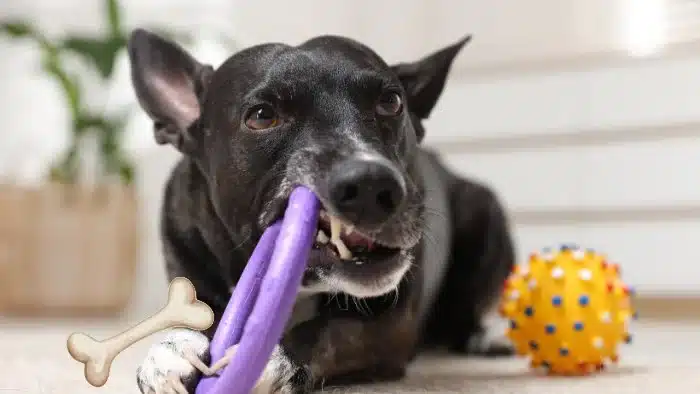Does Your Dog Chew Everything?

Many dog owners are troubled by chewing. But dogs do not chew to make trouble. Chewing has physical or emotional reasons. From puppy teething to adult dogs with too much energy, from tooth pain to stress and anxiety, different chewing behavior means different needs. We first need to understand the signals, then guide the dog in the right direction.
1) Puppies chew because of teething
This is a normal need. At 4–6 months old, puppies lose baby teeth and grow adult teeth. Just like kids, their gums feel itchy and uncomfortable. Chewing creates friction, reducing discomfort and helping baby teeth fall out. Instead of scolding, we should give proper chew toys . You can also freeze the toy — the cold feeling helps reduce gum swelling and makes furniture less attractive.
2) Adult dogs may chew because of extra energy
Some breeds need a lot of exercise, such as Border Collies, Golden Retrievers, and Huskies. If they stay at home too long and cannot run or think, they will chew to release energy. You will also see other signs — destruction of objects, barking, and overexcitement. To fix this, do not only stop them. You must meet their exercise needs: 1–2 hours outdoors every day — running, frisbee, obedience training. When the dog is tired, it has no energy to chew things in the house.
3) Tooth problems can cause painful chewing
If the dog has dental disease (cavity, tartar, gum inflammation), chewing can temporarily reduce pain. Broken teeth or objects stuck in the teeth can also cause chewing problems. This type of chewing often has other signs: refusal of hard food, drooling, bad breath, and pawing at the mouth. If you see these, take the dog to a vet. Cleaning, pulling teeth, or removing foreign objects will solve the root problem. Regular brushing and dental treats help prevent this.
4) Emotional chewing
Chewing may also be emotional. Dogs may chew when they are anxious, scared, or lonely. For example, when the owner is away for a long time, dogs with separation anxiety may chew clothes or slippers with the owner’s smell for comfort. Moving to a new home or adding a new family member can also cause stress. In this case, chewing involves selection; they choose things that make them feel safe. We should help them relax: leave old clothes with the owner’s smell, give puzzle toys, and spend more time with them. For severe separation anxiety, the vet may suggest a calming collar or medication.
How to deal with chewing
The best strategy is guide and redirect. First, find the reason: teething? too much energy? tooth pain? or emotional stress? Then take the right solution: chew toys, more exercise, dental care, or emotional support. Do not hit or yell. Simply move the dog to the correct chew toy. They need to learn what is allowed and what is not allowed.
Chewing is a natural behavior. We should not fully stop it. We should guide it. When the dog has the right toy, enough exercise, and enough love, chewing will not be a problem — and your dog will become a better, calmer partner.

